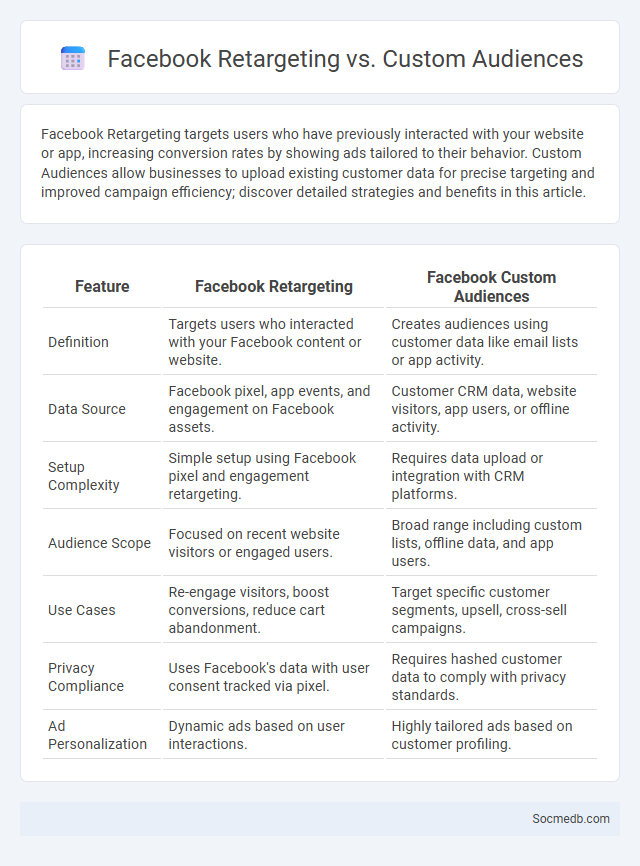
Photo illustration: Facebook Retargeting vs Custom Audiences
Facebook Retargeting targets users who have previously interacted with your website or app, increasing conversion rates by showing ads tailored to their behavior. Custom Audiences allow businesses to upload existing customer data for precise targeting and improved campaign efficiency; discover detailed strategies and benefits in this article.
Table of Comparison
| Feature | Facebook Retargeting | Facebook Custom Audiences |
|---|---|---|
| Definition | Targets users who interacted with your Facebook content or website. | Creates audiences using customer data like email lists or app activity. |
| Data Source | Facebook pixel, app events, and engagement on Facebook assets. | Customer CRM data, website visitors, app users, or offline activity. |
| Setup Complexity | Simple setup using Facebook pixel and engagement retargeting. | Requires data upload or integration with CRM platforms. |
| Audience Scope | Focused on recent website visitors or engaged users. | Broad range including custom lists, offline data, and app users. |
| Use Cases | Re-engage visitors, boost conversions, reduce cart abandonment. | Target specific customer segments, upsell, cross-sell campaigns. |
| Privacy Compliance | Uses Facebook's data with user consent tracked via pixel. | Requires hashed customer data to comply with privacy standards. |
| Ad Personalization | Dynamic ads based on user interactions. | Highly tailored ads based on customer profiling. |
Introduction to Facebook Retargeting and Custom Audiences
Facebook retargeting leverages pixel tracking to identify users who previously interacted with your website or content, enabling precise ad delivery to re-engage potential customers. Custom Audiences harness data such as email lists, website visitors, and app users to create tailored marketing campaigns that boost conversion rates. Utilizing these tools effectively allows you to maximize ad spend efficiency and increase return on investment by targeting users most likely to convert.
What is Facebook Retargeting?
Facebook retargeting is a powerful advertising strategy that targets users who have previously interacted with Your website or Facebook content. By utilizing Facebook Pixel, businesses track user behavior to deliver personalized ads, increasing conversion rates and brand recall. This method ensures Your marketing efforts reach an audience already interested, maximizing ad spend efficiency.
What are Custom Audiences on Facebook?
Custom Audiences on Facebook enable advertisers to retarget users who have already interacted with their business through various channels such as website visits, app activity, or customer lists. This powerful tool leverages Facebook Pixel data and CRM integrations to create highly specific audience segments, increasing the relevance and effectiveness of ad campaigns. Utilizing Custom Audiences can boost conversion rates by delivering tailored ads to users with prior engagement history.
Retargeting vs Custom Audiences: Key Differences
Retargeting targets users who have previously interacted with your website or app, aiming to re-engage them through personalized ads based on their past behavior. Custom Audiences allow you to upload customer data like email lists or phone numbers to create highly specific audience segments for targeted campaigns on platforms like Facebook and Instagram. Understanding these key differences can help you optimize your social media advertising strategy by effectively reaching both new prospects and existing users.
Benefits of Facebook Retargeting Campaigns
Facebook retargeting campaigns significantly boost conversion rates by targeting users who have already shown interest in a product or service, increasing the likelihood of purchase. These campaigns improve ad relevance and user engagement by delivering personalized content based on previous interactions, reducing ad spend wastage. Enhanced brand recall and customer retention are achieved through repeated exposure, making Facebook retargeting a cost-effective strategy for maximizing return on investment (ROI).
How Custom Audiences Improve Ad Personalization
Custom Audiences on social media platforms enhance ad personalization by enabling advertisers to target users based on their previous interactions, such as website visits, app activity, or customer lists. This targeted approach increases relevance, leading to higher engagement and conversion rates. Leveraging data from Custom Audiences allows brands to deliver tailored content that resonates with specific demographics and user behaviors.
When to Use Facebook Retargeting vs Custom Audiences
Facebook Retargeting is most effective when you want to re-engage users who have already interacted with Your website or app, delivering personalized ads based on their previous behavior to boost conversion rates. Custom Audiences allow you to target specific groups by uploading contact lists or engaging users on Facebook, ideal for reaching existing customers or segmented leads with tailored messaging. Choosing between the two depends on whether you aim to reconnect with prior site visitors through retargeting or leverage detailed customer data for precise audience targeting.
Best Practices for Facebook Retargeting Strategies
Effective Facebook retargeting strategies leverage custom audiences based on your website traffic, engagement, and customer lists to maximize conversion rates. You should create dynamic ads tailored to users' previous interactions, delivering personalized content that aligns with their interests and purchase intent. Regularly analyzing campaign performance and refining targeting parameters ensures your retargeting efforts maximize ROI and drive sustained engagement on Facebook.
Common Mistakes to Avoid in Facebook Retargeting and Custom Audience Campaigns
Facebook retargeting campaigns often fail due to improper audience segmentation and overexposure, leading to ad fatigue and reduced ROI. Ignoring frequency caps and neglecting to exclude converted users can cause wasted budget and lower engagement rates. To optimize Your campaigns, ensure precise audience targeting, regular list updates, and strategic frequency limits.
Conclusion: Choosing the Right Approach for Your Marketing Goals
Selecting the right social media strategy depends on clearly defined marketing goals such as brand awareness, lead generation, or customer engagement. Analyzing audience demographics, platform algorithms, and content types ensures optimal alignment with these objectives. Implementing data-driven adjustments based on performance metrics maximizes return on investment and long-term growth.
 socmedb.com
socmedb.com